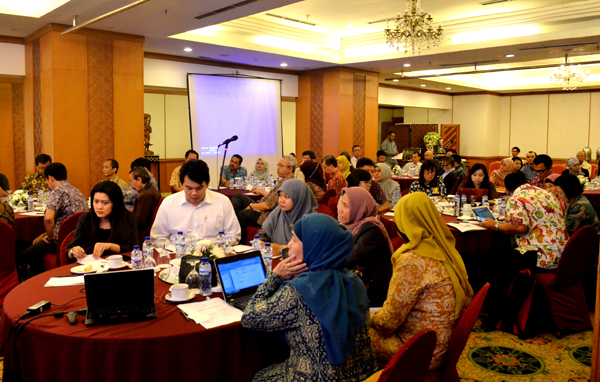Sebagai respon terhadap perkembangan regionalisasi perdagangan, negara-negara anggota ASEAN telah menyepakati pembentukan ASEAN Economic Community (AEC) pada tahun 2015 untuk menciptakan aliran barang dan jasa secara bebas dikawasan ASEAN dengan harapan dapat meningkatkan perekonomian negara-negara anggota ASEAN. Salah satu sektor yang menjadi prioritas integrasi ASEAN adalah peralatan kesehatan, yang akan diatur dalam ASEAN Medical Devices Directive (AMDD). Sektor perangkat peralatan medis memiliki peranan penting dalam proses diagnosis, pencegahan, pemantauan, dan pengobatan penyakit serta dalam meningkatkan kualitas hidup.
Indonesia sebagai negara terpadat ke 4 dunia dan terbesar di Asia Tenggara merupakan salah satu pasar terbesar di dunia untuk perangkat medis dan pelayanan kesehatan. Impor peralatan medis di Indonesia mencapai 97% dari pasar. Indonesia memiliki lebih dari 222 produsen peralatan medis dimana 90% nya merupakan UMKM yang menghasilkan produk medis primer seperti sarung tangan bedah, perban dan ortopedi, demikian ungkap Ketua Komite Akreditasi Nasional (KAN), Prof.Dr. Bambang Prasetya saat memberikan sambutannya pada acara Sosialisasi Akreditasi Sistem Manajemen Mutu Alat Kesehatan di Hotel Grand Sahid Jaya, Jakarta (25/02/204).
Acara Sosialisasi ini dihadiri oleh kurang lebih 70 orang yang merupakan perwakilan dari LSSM, LSPro, Asosiasi Lembaga Sertifikasi Indonesia (ALSI), ASPAKI, Gabungan Perusahaan Alat-alat Kesehatan dan Laboratorium (GAKESLAB), Kementerian Kesehatan, serta Asesor dan Panitia Teknis Akreditasi Bidang LSSMMAK dari Komite Akreditasi Nasional – KAN. Lebih lanjut Bambang Prasetya, menyampaikan bahwa pengembangan sistem penilaian kesesuaian sangat diperlukan mengingat peran sistem ini didalam memberikan jaminan kompetensi dan atau kesesuaian produk, jasa, atau sistem sesuai dengan persyaratan atau standar yang pada gilirannya dapat meningkatkan keberterimaan dan jaminan kepastian produk/jasa dalam transaksi perdagangan.
Jaminan kesesuaian dengan standar/kualitas menjadi kunci dalam upaya meningkatkan daya saing produk, hal itu juga merupakan pemastian dalam upaya perlindungan masyarakat baik itu dari sisi kesehatan, keselamatan maupun lingkungan hidup. KAN melakukan penilaian kompetensi terhadap lembaga sertifikasi untuk melakukan sertifikasi sistem manajemen, produk, dan personel disegala sektor perdagangan. Lembaga sertifikasi harus menerapkan dan menegakkan prinsip impartiality, competence, responsibility, opennes/transparan, confidentiality, dan responsiveness to complaints dalam seluruh proses seleksi, determinasi dan atestasi.
Skema akreditasi dan sertifikasi sistem manajemen mutu peralatan kesehatan telah dilaunching pada 17 Oktober 2013 oleh Direktur Jenderal Bina Kefarmasian dan Alat Kesehatan bersama Ketua KAN dan Sekjen KAN pada acara Indonesia Quality Expo di Jakarta Convention Center. Skema akreditasi dan sertifikasi KAN untuk Sistem Manajemen Mutu Alat Kesehatan (SMMAK) ini berbasis standar internasional ISO 13485 yang sudah diadopsi menjadi SNI ISO 13485.
Dengan adanya skema ini kami berharap dapat memfasilitasi para pelaku usaha dalam membuktikan kesesuaiannya terhadap konsistensi produk maupun jasa yang dihasilkan sesuai persyaratan pelanggan dan regulasi yang berlaku sehingga pada akhirnya mampu meningkatkan daya saing produk nasional, ujar Bambang mengakhiri sambutannya.
Memasuki sesi diskusi panel, kegiatan ini menghadirkan 3 orang narasumber, yaitu Dra. Lili Sadiah Yusuf, Apt. dari Direktorat Bina Produksi dan Distribusi Alat Kesehatan, Kementerian Kesehatan RI, Konny Sagala, Direktur Akreditasi Lembaga Sertifikasi KAN, dan Weni Widjajanto dari ALSI, serta dimoderatori oleh Kepala Bidang Akreditasi Sistem Manajemen-Pusat ALS BSN, Triningsih Herlinawati.
Dalam paparan mengenai Regulasi Terkait Sistem Manajemen Mutu Alat Kesehatan, Lili Sadiah Yusuf, Apt menjelaskan tentang dasar regulasi hukum terkait kesehatan dan alat-alat kesehatan. Beliau juga mengungkapkan bahwa Indonesia merupakan negara yang memiliki penduduk terbesar di ASEAN, di mana tingkat ekonomi Indonesia semakin baik dan diprediksi akan terus meningkat, sehingga dibutuhkan program kesehatan yang memerlukan banyak kebutuhan alat kesehatan.
Selain itu Lili Sadiah juga memaparkan bagaimana antisipasi menghadapi era perdagangan bebas, serta bagaimana persiapan Indonesia menghadapi implementasi AEC pada tahun 2015 di mana produsen alat kesehatan yang dipasarkan di ASEAN mandatory untuk menerapkan ISO 13485.
Pada sesi berikutnya, Konny Sagala memaparkan tentang Skema Akreditasi dan Sertifikasi SMMAK. Konny menjelaskan beberapa hal terkait skema ini seperti alur proses akreditasi, acuan persyaratan skema akreditasi dan sertifikasi SMMAK, acuan persyaratan produsen alat kesehatan, SNI ISO 13485: 2003 termasuk isi dan persyaratannya, langkah memperoleh sertifikasi dari LSSMMAK, serta acuan persyaratan LSSMMAK.
Paparan terakhir, Weni Widjajanto membahas tentang Perkembangan Sertifikasi SMMAK. Sosialisasi ini dtujukan untuk menyiapkan produsen Indonesia untuk alat kesehatan dalam implementasi ASEAN Medical Devices Directive (AMDD) serta menyiapkan infrastruktur Lembaga Sertifikasi Sistem Manajemen Mutu Alat Kesehatan Nasional dalam skema KAN sehingga akan memudahkan produsen dalam memperoleh sertifikasi SNI ISO 13485 dengan biaya yang relatif terjangkau.




